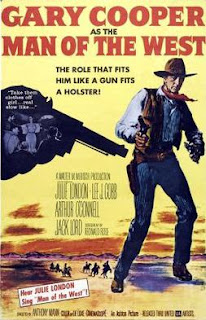Man Of The West
The Criterion Channel has just started a new collection entitled "Western Noir," eleven films that depict the Wild West with some elements of noir creeping in. Of course film noir is most associated with cities and their shadows, but even in the wide open spaces of the American West noir can be found.
I started, at random, with Man Of The West, from 1958, directed by Anthony Mann, who made a series of Westerns in the '50s that were of a noirish tone. The title means nothing--any Western could be called Man Of The West. It's an interesting psychodrama with some standard Western tropes, but also unusually vivid in its depictions of family and sexuality.
Gary Cooper stars as a man who has arrived in a town in Texas in order to catch a train to Fort Worth. We're immediately on alert when a sheriff seems to recognize him, and then when he gives different names to different people. While on the train a card sharp (Arthur O'Connell) strikes up a conversation with him, and learns that Cooper is going to hire a teacher for his small town. He is also introduced to a saloon singer (Julie London) leaving town, who has a background as a teacher.
But the train is beset by bandits, and this trio is left stranded by the tracks, several miles from the nearest town. But Cooper is familiar with the area, and leads them to a ramshackle house where he once lived. There they find the train robbers, led by Lee J. Cobb. It turns out Cooper was once part of that gang.
Cobb plays Cooper's uncle (though the actor was ten years younger than Cooper) and members of the gang are his cousins. Cobb indicates that he felt betrayed when Cooper left to go straight, and is overjoyed that he's back. The other gang members, particularly Jack Lord and John Dehner, see through Cooper's deception, but Cobb, like a father who can't help but forgive a wayward son, is determined to believe Cooper will help him rob a bank.
The film contains a few scenes that are strikingly bold in terms of sex, given the times (the National League of Decency objected). Cooper tells the gang that London is his woman, even though they have just met, to try to keep her safe, but Lord orders her to strip. She gets down to her petticoats before Cobb stops it (the scene is hard to watch, and seems designed to both show humiliation and to titillate). But then later in the film it is clearly shown that Cobb has raped London. This was not something you'd fine in a Roy Rogers film.
Man Of The West has some familiar scenes--the train robbery, a drawn-out fistfight between Cooper and Lord (Cooper makes Lord take off his clothes, and says, "See how you like it") and then a shootout in a ghost town. But though these familiar elements are here, the film has a tone that is much more modern. The moral ambiguity, key to noir, gets under the skin.
I started, at random, with Man Of The West, from 1958, directed by Anthony Mann, who made a series of Westerns in the '50s that were of a noirish tone. The title means nothing--any Western could be called Man Of The West. It's an interesting psychodrama with some standard Western tropes, but also unusually vivid in its depictions of family and sexuality.
Gary Cooper stars as a man who has arrived in a town in Texas in order to catch a train to Fort Worth. We're immediately on alert when a sheriff seems to recognize him, and then when he gives different names to different people. While on the train a card sharp (Arthur O'Connell) strikes up a conversation with him, and learns that Cooper is going to hire a teacher for his small town. He is also introduced to a saloon singer (Julie London) leaving town, who has a background as a teacher.
But the train is beset by bandits, and this trio is left stranded by the tracks, several miles from the nearest town. But Cooper is familiar with the area, and leads them to a ramshackle house where he once lived. There they find the train robbers, led by Lee J. Cobb. It turns out Cooper was once part of that gang.
Cobb plays Cooper's uncle (though the actor was ten years younger than Cooper) and members of the gang are his cousins. Cobb indicates that he felt betrayed when Cooper left to go straight, and is overjoyed that he's back. The other gang members, particularly Jack Lord and John Dehner, see through Cooper's deception, but Cobb, like a father who can't help but forgive a wayward son, is determined to believe Cooper will help him rob a bank.
The film contains a few scenes that are strikingly bold in terms of sex, given the times (the National League of Decency objected). Cooper tells the gang that London is his woman, even though they have just met, to try to keep her safe, but Lord orders her to strip. She gets down to her petticoats before Cobb stops it (the scene is hard to watch, and seems designed to both show humiliation and to titillate). But then later in the film it is clearly shown that Cobb has raped London. This was not something you'd fine in a Roy Rogers film.
Man Of The West has some familiar scenes--the train robbery, a drawn-out fistfight between Cooper and Lord (Cooper makes Lord take off his clothes, and says, "See how you like it") and then a shootout in a ghost town. But though these familiar elements are here, the film has a tone that is much more modern. The moral ambiguity, key to noir, gets under the skin.



Comments
Post a Comment